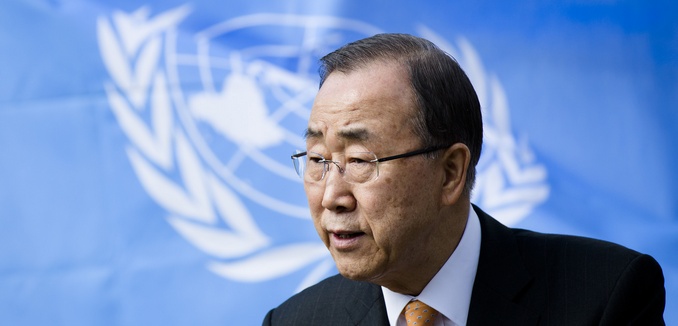Outgoing United Nations Secretary-General Ban Ki-moon acknowledged his organization’s bias against Israel on Friday, saying the “disproportionate” fixation ultimately also hurts the Palestinians.
“Over the last decade I have argued that we cannot have a bias against Israel at the UN,” Ban said in an address to the UN Security Council. “Decades of political maneuvering have created a disproportionate number of resolutions, reports and committees against Israel. In many cases, instead of helping the Palestinian issue, this reality has foiled the ability of the UN to fulfill its role effectively.”
Israeli Ambassador to the UN Danny Danon responded to Ban’s remarks by condemning the world body’s systemic bias against Israel.
“The Secretary-General admitted the clear truth, the UN’s hypocrisy towards Israel has broken records over the past decade,” Danon said in a statement. “During this time the UN passed 223 resolutions condemning Israel while only eight resolutions condemning the Syrian regime as it has massacred its citizens over the past six years. This is absurd.”
The Associated Press reported this past June that, while human rights are violated worldwide and thousands have been killed in Syria, Iraq, and Yemen, only Israel “has its record inspected at every single session of the United Nations Human Rights Council (UNHRC).” From all the nations in the world, only Israel is subject to a permanent agenda item – Item 7 – that forces the UNHRC to review “the human rights implications of Israel’s occupation of Palestinian territory” during every session. “The standing item at the 10-year-old council has come to exemplify the spotlight on Israel in a number of UN bodies,” the AP noted.
One of the driving forces behind the UN’s focus on Israel is the influential Organization for Islamic Cooperation, which often spearheads the push for anti-Israel resolutions, the AP explained. Rich nations are also able to use their resources to prevent scrutiny of their behavior, as Saudi Arabia did when blocking UN efforts to investigate its airstrike campaign in neighboring Yemen.
Ban criticized the UNHRC’s singular focus on Israel shortly after assuming his post in 2007, saying that he was “disappointed at the council’s decision to single out only one specific regional item, given the range and scope of allegations of human rights violations throughout the world.”
UNESCO, the UN’s cultural body, adopted two Arab-sponsored resolutions ignoring Jewish and Christian ties to the Temple Mount this past October, prompting Israeli objections.
Earlier this year, U.S. Ambassador to the UN Samantha Power underscored the injustice of the UN’s singular focus on Israel:
As you all know, the UN Charter guarantees “the equal rights of nations large and small,” and yet we have seen member states seek to use the UN Security Council, the General Assembly, and even the most arcane UN committees in ways that cross the line from legitimate criticisms of Israel’s policies to attempts to delegitimize the state of Israel itself. The only country in the world with a standing agenda item at the Human Rights Council is not North Korea, a totalitarian state that is currently holding an estimated 100,000 people in gulags; not Syria, which has gassed its people – lots of them. It is Israel.
Bias has extended well beyond Israel as a country, Israel as an idea – it even extends to Israeli organizations. Some of you may know the group ZAKA – an Israeli humanitarian group that helps save lives in disasters and ensures proper burial for the victims of those tragedies. ZAKA not only works here in Israel, but it responds to natural and manmade disasters worldwide, as it did in New York after 9/11, and in Haiti after the 2010 earthquake. Yet when ZAKA was nominated in 2013 for accreditation by the UN’s NGO committee – and this accreditation is what gives NGOs the right to participate in UN meetings, the right to assert their voices, the right to raise causes that really can matter in the world – when ZAKA was put forward it was denied approval. Five subsequent times the committee met, and five times member states blocked ZAKA – not because of the quality of its work, people weren’t that interested in the quality of its work, but simply because ZAKA is an Israeli organization.
[Photo: Ministerie van Buitenlandse Zaken / Flickr]




